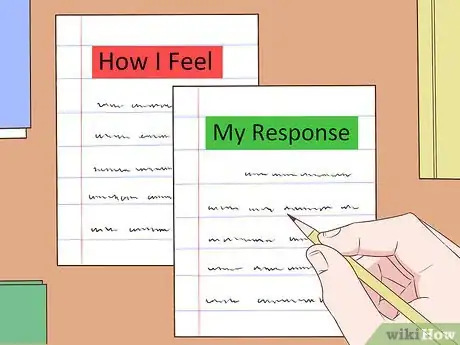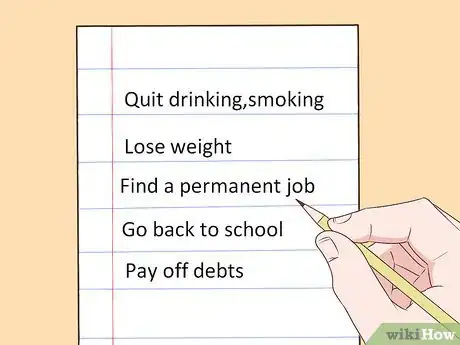This article was co-authored by Jennifer Butler, MSW. Jennifer Butler is a Love & Transformation Coach and the Owner of JennJoyCoaching, a life coaching business based in Miami, Florida, although Jennifer works with clients all over the world. Jennifer’s work centers around empowering women who are navigating any stage of the divorce or breakup process. She has over four years of life coaching experience. She is also the co-host of the Deep Chats Podcast along with Leah Morris and the host of season 2 “Divorce and Other Things You Can Handle” by Worthy. Her work has been featured in ESME, DivorceForce, and Divorced Girl Smiling. She received her Masters of Social Work (MSW) from New York University. She is also a Certified Health Coach, a Communications & Life Mastery Specialist, and a Certified Conscious Uncoupling and Calling in “the One” coach.
There are 22 references cited in this article, which can be found at the bottom of the page.
This article has been viewed 98,732 times.
Feelings are cognitive reactions that assign meaning to your emotions. Feelings can seem too intense, leading people to engage in coping strategies such as watching tv for hours on end, shopping or gambling.[1] Unchecked, these coping strategies can lead to further undesirable outcomes such as debt, addiction and poor health. This then leads to more intense feelings, creating a vicious cycle. This article will show you practical steps you can take to dealing with your feelings.
Steps
Feeling the Feelings
-
1Recognize that feelings are a validation of our internal world.[2] They are a result of how we think about the world around us.[3] Positive feelings are those that ‘feel good’ and negative feelings are those that ‘feel bad’; they are not ‘right’ or ‘wrong’.[4] Both negative and positive feelings are a normal part of the human experience. Allowing yourself to feel them puts you in a better position to change any situation related to your feelings.
- Feelings help us to identify our needs. For example, the feeling of fear began as a way to alert us to threats of danger to our survival. Feeling afraid might literally have been the difference between life and death for our early ancestors. Acknowledging that feelings have use, even when we don't necessarily enjoy those feelings, can help you manage them.[5]
-
2Breathe deeply. Breathing exercises help you calm down, reel in emotion, gain control and feel more connected to your body.[6] You can only process emotions when you are feeling relatively calm.[7] Try the following breathing exercise. Place your hand on your stomach and inhale through your nose, counting to five. Feel your stomach rise as you inhale. Exhale through your mouth, counting to five. Feel your stomach fall as you breathe out.Advertisement
-
3Notice the feeling. Where is it in your body? How intense is it? How is your breathing? What is your posture like? What does your face feel like? Is it getting stronger or weaker? Pay attention to the different parts of your body the emotion seems to be affecting. Notice your heart rate, your stomach, your temperature, your extremities, your muscles and any sensations on your skin.[8]
-
4Name the emotion. What word best describes it? Anger? Guilt? Anxiety? Sadness? Fear?[9] For example, anger feels hot, pulses through your body and increases your heart rate, amongst other things.[10] Anxiety can create shortness of breath, increases your heart rate, and can cause sweaty palms and feet, and tightness in your chest.[11]
- It’s possible to feel more than one emotion at once. Try to acknowledge any and all feelings that you're experiencing.[12]
-
5Accept the feeling. Let it pass through you without judging, resisting, or struggling against it.[13] Allow it to be - it is a natural body reaction.[14] If you notice any thought or judgement about the feeling, notice it, then focus your attention back on the physical sensations in your body.
- Sometimes, this is enough to help you deal with your feelings. It takes a lot of mental effort to ignore a feeling or avoid and suppress it. In fact, doing so can make the feeling stronger and last longer.[15] Accepting and not fearing your feelings, frees your mind to deal with the situation at hand that is causing your feelings.
Processing the Feelings on Your Own
-
1Write for up to 15 minutes about how you are feeling. Write about the situation that has given rise to these feelings. What happened? Who said what? Why is this important to you? Identify and name your feelings. Don’t edit or censor and don’t worry about spelling, grammar and sentence structure. Be honest with yourself. Write it all out.
- The more honest you are, the better your chances of lessening the severity of your feelings.[16]
- This gives you distance from your thoughts and allows you to take a more objective look at the situation.
-
2Look for negative thoughts and patterns. Often times, negative ways of thinking become habit and we believe our thoughts to be truth.[17] Try and see how much of what you’ve written is based on fact and how much of it is your opinion. That the way you think creates the way you feel is a core premise of cognitive behavioral therapy.[18] This exercise will help you deal with your thoughts in order to deal with your feelings.
- It’s easier to spot flaws in your thinking when all the thoughts are physically written for you to read and see.[19]
-
3Write a response as you would to a beloved friend. We are often judgmental and criticize ourselves where we would not others. Be kind and think of logical arguments and responses to what you’ve written. Present facts and give comforting advice.
- If you’re not comfortable writing, consider recording your thoughts on a voice recorder app (speak up to ten minutes at a time). Listen to your recording once you are done speaking. As you listen, notice any unhelpful thinking. Repeat the process up to three times.
-
4Read your response. Once you’re finished writing, read through what you’ve written. Put it away and read it again after a night’s sleep or after 24 hours. In the mean time, try to do an activity that you find relaxing or a hobby you enjoy. Time will help give you distance from the emotion and a fresh perspective.
- It’s best to keep your writing somewhere no one else will find it. Knowing your thoughts will be private will help you be more honest with yourself.[20]
Processing Your Feelings With Someone You Trust
-
1Find someone you trust and love to talk to. Tell this person you would like to discuss something with her confidentially. It’s easier talking to someone you love about your problems.[21] Ask her if it is a good time to talk. A person who is preoccupied or stressed herself may not be in the best position to help you. If possible, pick a trusted person who you know has gone through a similar experience to yours. She is more likely to understand your current position and her empathy can be consoling.[22]
-
2Tell the person about your feelings. Tell your confidant about what happened that gave rise to these feelings. Tell her why it’s important to you. Voice anything that you are thinking and need to get off your chest. Simply voicing how you feel has a cathartic effect and is beneficial for your physical health too.
-
3Ask your confidant for her opinion on the subject. In response to your story, the other person may share her own personal experiences and show you that whatever happened to you can happen to anyone. She may give you a fresh perspective that you had not thought of before.
Dealing with the Source of the Feeling
-
1Deal with negative thoughts. Take stock of your level of feeling. Now that you have processed the feelings and looked at your situation from all angles, is there another way of interpreting the events that happened? How have your feelings changed since you started processing them? Feelings change as our thoughts change.
-
2Consider actions you can take to change the situation. On your own, or with your loved one, make a list of possible things you can do to change the situation you are in. Consider the consequences, the effort required and whether or not you should ask someone else for help. What you do will be different depending on the individuals involved and your relationship with them (family, romantic partner, friend, acquaintance, coworker, boss) so think about what is appropriate for your situation.
-
3Take action. Do what you can to change the situation you are in. If you were responsible in some way, be honest about that and take responsibility for your actions. Sincerely apologize for any mistakes you've made and try to make amends. Knowing you did the best you can is an important part of seeking closure for feelings.[23]
-
4Close this chapter of your life. For whatever reason, if your attempts to resolve the situation are ineffective or if it's literally impossible for you to come to terms with the people involved in this situation (e.g., they're deceased or they have cut off all contact with you), you need to love yourself enough to move on. Know that you’ve done all you can and that you've learned from this situation. Remember the lessons you've learned.
-
5Talk to a therapist. Sometimes, it can be tricky to figure out where feelings are coming from. A therapist can help you uncover the source of your feelings and learn ways to deal with them effectively.
- You can use this therapist locator to help you find a trained professional in your area. You can also ask your doctor for a referral.
- It's a common misconception that you have to have huge or unmanageable problems to see a therapist. In fact, a therapist can help you identify the unhelpful ways of thinking and behaving in your everyday life and learn better ways to live an emotionally stable and fulfilling life.
References
- ↑ http://www.sciencedirect.com/science/article/pii/S1476179306001327
- ↑ http://psychcentral.com/lib/why-are-feelings-important/
- ↑ https://books.google.com.pk/books/about/The_Client_s_Guide_to_Cognitive_behavior.html?id=9HsVzASsKfcC&redir_esc=y
- ↑ http://journals.lww.com/practicalpsychiatry/Citation/2010/03000/Positive_and_Negative_Emotions.1.aspx
- ↑ http://psychcentral.com/lib/why-are-feelings-important/
- ↑ http://www.stress.org/take-a-deep-breath/
- ↑ http://www.npr.org/2010/12/06/131734718/just-breathe-body-has-a-built-in-stress-reliever
- ↑ http://kalimunro.com/wp/articles-info/emotions-and-feelings/feelings-identifying-how-you-feel
- ↑ https://itherapy.com/wp-content/uploads/Mindfulness-Emotions-Exercise.pdf
- ↑ http://www.cyh.com/HealthTopics/HealthTopicDetailsKids.aspx?p=335&np=287&id=1728#2
- ↑ https://www.beyondblue.org.au/the-facts/anxiety/signs-and-symptoms
- ↑ hhttp://timhillpsychotherapy.com/feeling-multiple-emotions/
- ↑ Jennifer Butler, MSW. Life Coach. Expert Interview. 31 July 2020.
- ↑ http://www.sciencedirect.com/science/article/pii/S1053811912005678
- ↑ http://www.sciencedirect.com/science/article/pii/S0005796705002068
- ↑ http://psycnet.apa.org/psycinfo/1997-43182-010
- ↑ https://www.psychologytoday.com/blog/what-mentally-strong-people-dont-do/201501/10-thinking-errors-will-crush-your-mental-strength
- ↑ https://www.psychologytoday.com/basics/cognitive-behavioral-therapy
- ↑ hhttps://psychcentral.com/blog/4-journaling-exercises-to-help-you-manage-your-emotions
- ↑ https://books.google.com.pk/books?id=F3gF8OoKydQC&redir_esc=y
- ↑ https://books.google.com.pk/books?id=F3gF8OoKydQC&redir_esc=y
- ↑ http://crx.sagepub.com/content/20/5/723.refs
- ↑ https://www.psychologytoday.com/blog/in-flux/201104/5-ways-find-closure-the-past
- ↑ http://psychcentral.com/lib/the-health-benefits-of-journaling/






















-Step-11.webp)






















































Medical Disclaimer
The content of this article is not intended to be a substitute for professional medical advice, examination, diagnosis, or treatment. You should always contact your doctor or other qualified healthcare professional before starting, changing, or stopping any kind of health treatment.
Read More...